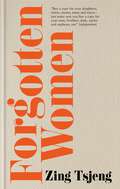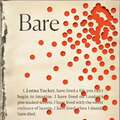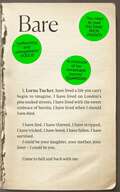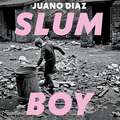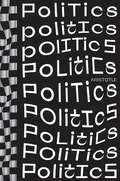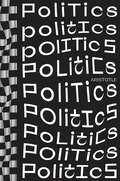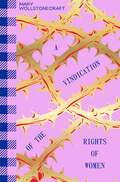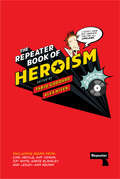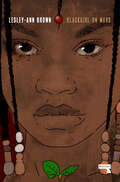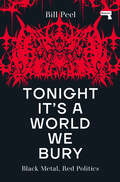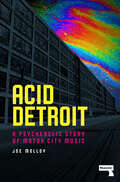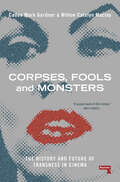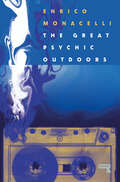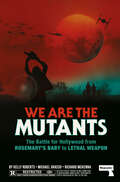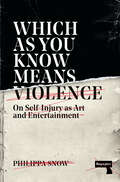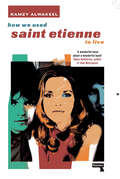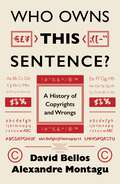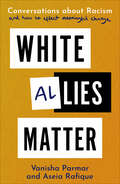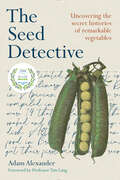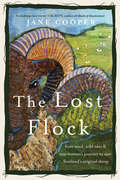- Table View
- List View
Forgotten Women
by Zing Tsjeng'To say this [book] is "empowering" doesn't do it justice. Buy a copy for your daughters, sisters, mums, aunts and nieces - just make sure you buy a copy for your sons, brothers, dads, uncles and nephews, too.' - indy100'Here's to no more forgotten women.' - Evening StandardForgotten Women reaches around the world and its history to rediscover, retell and reinstate the lives of over 190 important and significant women. From Neolithic times to modernity, Zing Tsjeng has traced the women who have shaped their age and revolutionised society. In this book lies the strength, lives and sacrifices of women who have refused to accept the hand they've been dealt and have changed the course of our futures accordingly.
BARE: 'You have to read this book' MICK JAGGER
by Lorna TuckerThe inspirational true story of one woman's fight to survive on the streets of LondonI, Lorna Tucker, have lived a life that most you can't even begin to imagine...'You need to read this book' MICK JAGGER'Unflinching and unforgettable' VOGUE 'An essential read showcasing the resilience of the human spirit' JUANO DIAZI have lived in London's piss-soaked streets, I have lived with the sweet embrace of heroin, I have lived when I should have died.I have lied, I have thieved, I have stripped, I have tricked, I have loved, I have fallen, I have survived. I could be your daughter, your mother, your lover - I could be you.Come to hell and back with me.AN EYE-OPENING, PERSONAL ACCOUNT OF FEMALE HOMELESSNESS, FROM ONE OF BRITAIN'S MOST EXCITING FILM-MAKERS
BARE: 'You have to read this book' MICK JAGGER
by Lorna TuckerThe inspirational true story of one woman's fight to survive on the streets of LondonI, Lorna Tucker, have lived a life that most you can't even begin to imagine...'You need to read this book' MICK JAGGER'Unflinching and unforgettable' VOGUE 'An essential read showcasing the resilience of the human spirit' JUANO DIAZI have lived in London's piss-soaked streets, I have lived with the sweet embrace of heroin, I have lived when I should have died.I have lied, I have thieved, I have stripped, I have tricked, I have loved, I have fallen, I have survived. I could be your daughter, your mother, your lover - I could be you.Come to hell and back with me.AN EYE-OPENING, PERSONAL ACCOUNT OF FEMALE HOMELESSNESS, FROM ONE OF BRITAIN'S MOST EXCITING FILM-MAKERS
BARE: 'You have to read this book' MICK JAGGER
by Lorna TuckerThe inspirational true story of one woman's fight to survive on the streets of LondonI, Lorna Tucker, have lived a life that most you can't even begin to imagine...'You need to read this book' MICK JAGGER'Unflinching and unforgettable' VOGUE 'An essential read showcasing the resilience of the human spirit' JUANO DIAZI have lived in London's piss-soaked streets, I have lived with the sweet embrace of heroin, I have lived when I should have died.I have lied, I have thieved, I have stripped, I have tricked, I have loved, I have fallen, I have survived. I could be your daughter, your mother, your lover - I could be you.Come to hell and back with me.AN EYE-OPENING, PERSONAL ACCOUNT OF FEMALE HOMELESSNESS, FROM ONE OF BRITAIN'S MOST EXCITING FILM-MAKERS
Slum Boy: One of the most moving accounts of non-fiction ever written
by Juano Diaz'ONE OF THE MOST MOVING ACCOUNTS OF NON-FICTION EVER WRITTEN' GUARDIAN 'If you like Shuggie Bain, then Slum Boy is for you' LEMN SISSAY'A heart-breaking, inspiring read' ALAN CUMMING'The best book we have ever read' GILBERT & GEORGEJohn MacDonald is a four-year-old boy growing up in the slums of Glasgow. His mother is an addict, who leaves him starving in their flat for days at a time.When a neighbour files a report, John is wrenched away from her and placed into the care system. There, he has experiences he's too young to understand which his eventual adoptive parents silence as he grows into a gay man within the Romani community.But John dreams of being reunited with his mother and will stop at nothing to find her. Slum Boy is abouthow, against all odds, John found a way to his mother and true identity, Juano Diaz.'Remarkable' TIMES LITERARY SUPPLEMENT'Beautiful. I hope it finds a million readers' ANDREW O'HAGAN'Compulsively readable' PATRICK GALEIn 2024, Juano Diaz was awarded the Pride Awards for LGBTQ+ Heroes Changing the World.
Slum Boy: One of the most moving accounts of non-fiction ever written
by Juano Diaz'ONE OF THE MOST MOVING ACCOUNTS OF NON-FICTION EVER WRITTEN' GUARDIAN 'If you like Shuggie Bain, then Slum Boy is for you' LEMN SISSAY'A heart-breaking, inspiring read' ALAN CUMMING'The best book we have ever read' GILBERT & GEORGEJohn MacDonald is a four-year-old boy growing up in the slums of Glasgow. His mother is an addict, who leaves him starving in their flat for days at a time.When a neighbour files a report, John is wrenched away from her and placed into the care system. There, he has experiences he's too young to understand which his eventual adoptive parents silence as he grows into a gay man within the Romani community.But John dreams of being reunited with his mother and will stop at nothing to find her. Slum Boy is abouthow, against all odds, John found a way to his mother and true identity, Juano Diaz.'Remarkable' TIMES LITERARY SUPPLEMENT'Beautiful. I hope it finds a million readers' ANDREW O'HAGAN'Compulsively readable' PATRICK GALEIn 2024, Juano Diaz was awarded the Pride Awards for LGBTQ+ Heroes Changing the World.
Slum Boy: A Portrait
by Juano DiazOne of the most moving accounts of non fiction ever written according to the Guardian 'This is a heart-breaking story, beautifully told. I hope it finds a million readers' - Andrew O'Hagan'What a brave and powerful story. If you like Shuggie Bain and Damian Barr then Slumboy is for you' - Lemn Sissay'Compulsively readable, it's Dickensian in its rich cast of Glaswegian characters' - Patrick GaleJohn MacDonald must find his mother. Born into the slums of Glasgow in the late '70s, a 4-year-old John's life is filled with the debris of alcoholism and poverty. Soon after witnessing a drowning, his mother's addictions take over their lives, leaving him starving in their flat, awaiting her return.A concerned neighbor reports her, and he is forcibly taken away from his mother and placed into the care system. There, he dreams of being reunited with her. His mind is consumed with images and memories he can't process or understand, which his eventual adoptive parents silence out of fear as he grows into a young man within a strict Catholic and Romany Gypsy community.This memoir is about how John found his way to his true identity, Juano Diaz, and how, against all odds, his unstoppable love for his mother sets him free.
Politics
by AristotleA timeless study of politics and society by one of the all-time greatest thinkers.A student of Plato, Aristotle is considered a founding father of philosophy and ethics. This reflection on the role of government, and an individual's role within it, remains as prescient and relevant now as when it was written. One of the most influential books in history, Politics has influenced the greatest thinkers of the last 1,000 years and is a crucial book for those interested in evaluating the way our societies are structured.Part of a boldly designed series of classics, with wider margins for notes, this book is perfect for design-lovers and students alike. With bold, eye-catching graphic covers by Evi O Studio, this collection aims to introduce a selection of the most celebrated works of the last thousand years to a new audience. Featuring tales of adventure, fiction from the 19th and 20th centuries, feminist writings, and reflections on art, politics, philosophy and the origins of man, this is a small, wide-reaching and essential collection.'Man is naturally a political animal.'
Politics
by AristotleA timeless study of politics and society by one of the all-time greatest thinkers.A student of Plato, Aristotle is considered a founding father of philosophy and ethics. This reflection on the role of government, and an individual's role within it, remains as prescient and relevant now as when it was written. One of the most influential books in history, Politics has influenced the greatest thinkers of the last 1,000 years and is a crucial book for those interested in evaluating the way our societies are structured.Part of a boldly designed series of classics, with wider margins for notes, this book is perfect for design-lovers and students alike. With bold, eye-catching graphic covers by Evi O Studio, this collection aims to introduce a selection of the most celebrated works of the last thousand years to a new audience. Featuring tales of adventure, fiction from the 19th and 20th centuries, feminist writings, and reflections on art, politics, philosophy and the origins of man, this is a small, wide-reaching and essential collection.'Man is naturally a political animal.'
Politics
by AristotleA timeless study of politics and society by one of the all-time greatest thinkers.A student of Plato, Aristotle is considered a founding father of philosophy and ethics. This reflection on the role of government, and an individual's role within it, remains as prescient and relevant now as when it was written. One of the most influential books in history, Politics has influenced the greatest thinkers of the last 1,000 years and is a crucial book for those interested in evaluating the way our societies are structured.Part of a boldly designed series of classics, with wider margins for notes, this book is perfect for design-lovers and students alike. With bold, eye-catching graphic covers by Evi O Studio, this collection aims to introduce a selection of the most celebrated works of the last thousand years to a new audience. Featuring tales of adventure, fiction from the 19th and 20th centuries, feminist writings, and reflections on art, politics, philosophy and the origins of man, this is a small, wide-reaching and essential collection.'Man is naturally a political animal.'
A Vindication of the Rights of Woman (Cambridge Texts In The History Of Political Thought Ser.)
by Mary WollstonecraftA seminal book in a feminist conversation that still continues today.Now regarded as one of the founding feminist philosophers, Mary Wollstonecraft's writings have inspired conversation and action since their first publication. Wollstonecraft produced this declaration of female independence in 1792. Passionate, eloquent and forthright, it launched a scathing attack on the current understanding of women and laid out the tenets for a new vision: equal education, an end to prejudice and a chance for women to become defined by their profession, not their partner. Whereas Mary Wollstonecraft's work was received at the time with a mixture of admiration and outrage, she is now rightly viewed as a powerful matriarch of modern feminism.Part of a boldly designed series of classics, with wider margins for notes, this book is perfect for design-lovers and students alike. With bold, eye-catching graphic covers by Evi O Studio, this collection aims to introduce a selection of the most celebrated works of the last thousand years to a new audience. Featuring tales of adventure, fiction from the 19th and 20th centuries, feminist writings, and reflections on art, politics, philosophy and the origins of man, this is a small, wide-reaching and essential collection.'My own sex, I hope, will excuse me, if I treat them like rational creatures.'
The Repeater Book of Heroism
by Tariq Goddard & Alex NivenIn these impactful first-person essays, a selection of Repeater authors come together to write about what heroism means to them, trying to imagine a new kind of hero figure for the twenty-first century."I don&’t have any heroes, they&’re all useless", opined John Lydon in 1976. As a spokesperson of sorts for the punk generation, Lydon was giving voice to a nihilistic, deconstructive impulse which, for better or worse, would go on to dominate the next half-century or so of intellectual, cultural and political life. But isn&’t one of the problems with the modern world that we no longer have any real sense of what heroism is? What if we recovered heroism from the hands of the fascists and the neoliberal ideologues, and proclaimed that – despite everything – a hero can and should be something to be? In these personal, provocative essays, the authors behind the uncompromising project that is Repeater Books come together to redefine the idea of the hero for a twenty-first-century public which desperately needs something to believe in. From Eric Cantona to Wile E Coyote, Bruno Latour to Paula Rego, forgotten legends and anonymous family members, this compendium of extraordinary human behaviour is essential reading for anyone who has ever thought that, despite what Jean-Paul Sartre said, heaven is other people.
Blackgirl on Mars
by Lesley-Ann BrownBlackgirl on Mars is a radical memoir that chronicles author, educator and activist Lesley-Ann Brown's two years' worth of travel searching for "home".As she travels across the US during the Black Lives Matter protests and Covid-19 pandemic and then to Trinidad and Tobago to attend the funeral of her grandmother, Brown tells her own life-story, as well as writing about race, gender, sexuality, and education, and ideas of home, family and healing.Both a radical political manifesto and a moving memoir about finding your place in the world, Blackgirl on Mars is about what it means to be a Black and Indigenous woman in Europe and the Americas in the twenty-first century.
Tonight It’s a World We Bury: Black Metal, Red Politics
by Bill PeelTonight It&’s a World We Bury explores a range of tendencies central to black metal and uncovers their potential as critiques of capitalism.Tonight It's a World We Bury is a radical re-writing of the history and politics of black metal music.Challenging the commonly-held perception that black metal is a genre of the right — full of wannabe Vikings, Nazis, skinheads and other unsavoury characters — Tonight It's a World We Bury looks at an array of black metal artists to re-affirm the genre as radically anticapitalist, revolutionary and left-wing.Utilizing an eclectic range of black metal bands, including Darkthrone, Burzum, Liturgy and Deathspell Omega, and taking in the works of Marx, Nietzsche, Deleuze and more, Tonight It's a World We Bury is a book on black metal like no other.
Acid Detroit: A Psychedelic Story of Motor City Music
by Joe MolloyAcid Detroit tells the story of Motor City through its revolutionary music past and present, in order to find the seeds of radical transformation among its ruins.Acid Detroit is an exhilarating, technicolour view of Detroit&’s musical and social history from the 1960s to the present day. Redefining the counterculture as a time of Acid Communism, Acid Detroit diverges from most books on the Sixties, which centre on California, to show that Detroit was an unequalled hotbed of radical activism, urban unrest and sonic innovation. Considering Detroit's unique mix of people and cultures and enduring sonic legacies, it covers everything from incendiary garage rock, to European-influenced techno and experimental hip-hop crews, intertwining the artist&’s lives and works with the city&’s rise and decline, from its establishment as an industrial powerhouse to the high point of Motor City, into its decline and tentative rebirth. A mind-expanding tour through time and space that explores the lost possibilities, histories and hidden potentials of the city, Acid Detroit reveals a history of resilience and transformation hidden in the shadows of the abandoned factories and warehouses of the Motor City.
Corpses, Fools and Monsters: The History and Future of Transness in Cinema
by Willow Maclay Caden GardnerA radical history of transness in cinema, and an exploration of the political possibilities of its future.In the history of cinema, trans people are usually murdered, made into a joke, or viewed as threats to the normal order — relegated to a lost highway of corpses, fools, and monsters.In this book, trans film critics Caden Mark Gardner and Willow Catelyn Maclay take the reader on a drive down this lost highway, exploring the way that trans people and transness have evolved on-screen.Starting from the very earliest representations of transness in silent film, through to the multiplex-conquering Matrix franchise and on to the emergence of a true trans-authored cinema, Corpses, Fools and Monsters spans everything from musicals to body horror to avant garde experimental film to tell the story of the trans film image. In doing so, the authors investigate the wider history of trans representation — an exhilarating journey of compromise, recuperation, and potential liberation that they argue is only just the beginning.
The Great Psychic Outdoors: Adventures in Low Fidelity
by Enrico MonacelliExplores the weird world of lo-fi music to investigate its revolutionary potential and its ability to subvert what we think music can do.Homemade records, tape-hiss worship and a taste for a very peculiar kind of psychedelia have carved themselves a weird niche in the contemporary musical landscape under the name of lo-fi.This genreless genre, characterized by poor recordings and rough sounds, spanning from the most extreme heavy metal to the sweetest ear-candies pop can offer, has become a solid presence in our collective sensibility. And yet, it has largely been neglected: this staunch refusal of anything hi-fi and hi-tech has fallen under the radar of the categories we use to analyse ourselves and our times.The Great Psychic Outdoors, dedicated to the most interesting and controversial artists in this movement, will rectify this injustice and vindicate the revolutionary potential of lo-fi music, engaging with this weird genre on its own terms and facing head on the contradictions and possibilities of this multi-faceted phenomenon. Confronting the aesthetic and conceptual stakes of this sonic craft, The Great Psychic Outdoors shows what lo-fi says about us, our lives under capitalism and the strange ways we cope with pain, madness and beauty.
We Are the Mutants: The Battle for Hollywood from Rosemary's Baby to Lethal Weapon
by Kelly Roberts, Michael Grasso and Richard McKennaAn offbeat odyssey through the most daring and disruptive phase of American cinema since the advent of sound — during the most transformative and tumultuous period of American history since the Civil War.We Are the Mutants is a critical reassessment of what is arguably the most discussed and beloved stretch of movies in Hollywood history.Documenting the period between the arrival of US combat troops in Vietnam and the end of President Ronald Reagan&’s second term, it forgoes the usual and restrictive exemplars of &“auteur cinema,&” and instead focuses on an eclectic selection of films and genres — horror, documentary, disaster, vigilante action, neo-noir, post-apocalyptic sci-fi — to track this period's tumultuous transformation in American life, culture, and politics.Covering everything from Rosemary&’s Baby and Enter the Dragon to Escape from New York and Fatal Attraction, and from manufactured blockbusters and studio sleepers to forgotten Bs and cult classics, We Are the Mutants re-writes the history of modern American cinema, and in doing so, the history of America itself.
Which as You Know Means Violence: On Self-Injury as Art and Entertainment
by Philippa SnowA blending of art and pop cultural criticism about people who injure themselves for our entertainment or enlightenment.A few weeks before he died, Hunter S. Thompson left an answerphone message for Jackass' Johnny Knoxville: "I might be coming to Baton Rouge... and if I do I will call you, because I will be looking to have some fun, which as you know usually means violence." Fun does not, of course, mean violence for most people. Those who choose to make a hobby, a career or an art practice out of injury are wired differently — subject to unusual motivations, and quite often powered by an ardent death-drive.In Which as You Know Means Violence, writer and art critic Philippa Snow analyses the subject of pain, injury and sadomasochism in performance, from the more rarefied context of contemporary art to the more lowbrow realm of pranksters, stuntmen and stuntwomen, and uncategorisable, danger-loving YouTube freaks.In a world where violence — of the market, of climate change, of capitalism — is part of our everyday lives, Which as You Know Means Violence focuses on those who enact violence on themselves, for art or entertainment, and analyses the role that violence plays in twenty-first century culture.
How We Used Saint Etienne to Live
by Ramzy AlwakeelThe essential guide to veteran British indie favourites Saint Etienne — the story of how they made music out of memories, and how we made memories out of them.Do you remember how we used to live? British indie favourites Saint Etienne do. But they also remember a load of other stuff that never happened, so maybe they aren&’t the best people to ask.Saint Etienne have spent three decades making music out of memories for people who make memories out of music. How We Used Saint Etienne to Live is the story of that reciprocal process, told in the wrong order but the right time. It&’s about the methods we use to remember, and what happens when those methods become outdated. It&’s a tale that involves tape splicing, town planning, Now compilations and Saint Etienne&’s 1995 UK singles chart peak, &‘He&’s On The Phone&’.Featuring original interviews with Bob Stanley, Pete Wiggs and Sarah Cracknell, How We Used Saint Etienne To Live shows Saint Etienne&’s minds at work as they make and manipulate history and nostalgia. Expect to be shown the receipts. Expect selective recollections and shameless revisionism. Expect concrete facts and flights of fancy. Don&’t expect it to be immediately clear which is which.
Who Owns This Sentence?: A History of Copyrights and Wrongs
by David Bellos Alexandre MontaguCopyright is everywhere. Your smartphone incorporates thousands of items of intellectual property. Someone owns the reproduction rights to photographs of your dining table. At this very moment, battles are raging over copyright in the output of artificial intelligence programs. Not only books but wallpaper, computer programs and cuddly toys are now deemed to be intellectual properties - making copyright a labyrinthine construction of laws, covering almost all products of human creativity.Copyright has its roots in eighteenth-century London, where it was first established to limit printers' control of books. Principled arguments against copyright arose from the start and nearly abolished it in the nineteenth century. But a handful of little-noticed changes in the late twentieth century concentrated ownership of immaterial goods into very few hands. Who Owns This Sentence? is an often-humorous and always-enlightening cultural, legal, and global history of the idea that intangible things can be owned, and makes a persuasive case for seeing copyright as an engine of inequality in the twenty-first century.
White Allies Matter: Conversations about Racism and How to Effect Meaningful Change
by Vanisha Parmar Aseia RafiqueWhy do organizations and individuals in the UK and other countries still deny the realities of structural racism and unconscious bias?And when there is an acknowledgement of the problem, why are long-term solutions constantly avoided?Drawing on their personal backgrounds, professional experience and extensive research, Vanisha Parmar and Aseia Rafique expose the hypocrisy around racism in our organizations and society at large. White Allies Matter is a passionate and practical guide for starting conversations about racism and setting the groundwork for meaningful change.
The Seed Detective: Uncovering the Secret Histories of Remarkable Vegetables
by Adam Alexander‘Informative, enlightening and entertaining but also important.’ Mark Diacono ‘One of the most inspirational books I have encountered.’ Darina Allen ‘If you’re a vegetable growing addict or just curious about their origins, there’s something for everyone in Adam’s new book.’ Rob Smith, TV presenter 'The writing is rich . . . [This book] is a clarion call to think about our food in new ways and carefully consider where it comes from.' New Scientist Meet the Indiana Jones of vegetables on his quest to save our heritage produce. Have you ever wondered how everyday staples such as peas, kale, asparagus, beans, squash and sweetcorn ended up on our plates? Well, so did Adam Alexander. Adam’s passion for heritage vegetables was ignited when he tasted an unusual, sweet and fiery pepper while on a filmmaking project in Ukraine. Smitten by its flavour, he began to seek out local growers of old and near-forgotten varieties in a mission to bring home seeds to grow and share – saving them from being lost forever. In The Seed Detective, Adam tells of his far flung (and closer to home) seed-hunting adventures and reveals the stories behind many of our everyday vegetable heroes. How the common garden pea was domesticated from three wild species over 8,500 years ago, that the first carrots originated in Afghanistan (and were actually purple or red in colour), how Egyptian priests considered it a crime to look at a fava bean and that the Romans were fanatical about asparagus. Join The Seed Detective as he takes us on a journey that began when we left the life of hunter-gatherers to become farmers. Sharing storiesof globalisation, political intrigue, colonisation and serendipity, Adam shows us the vital part vegetables have played in our food story – and how they are the key to our future.
The Seed Detective: Uncovering the Secret Histories of Remarkable Vegetables
by Adam AlexanderMeet the Indiana Jones of vegetables and join him on his quest to save our heritage produce.Named BBC Radio 4's The Food Programme "Book of the Year"2023 GardenComm Media Awards Silver Laurel Medal of AchievementShortlisted for the Garden Media Guild&’s Garden Book of the Year Award 2023Longlisted for The Art of Eating Prize 2023"[This book] is a clarion call to think about our food in new ways and carefully consider where it comes from."—New ScientistDid you ever wonder how peas, kale, asparagus, beans, squash, and corn have ended up on our plates? Well, so did Adam Alexander.Adam Alexander is The Seed Detective. His passion for vegetables was ignited when he tasted an unusual sweet pepper with a fiery heart while on a filmmaking project in Ukraine. Smitten by its flavor, Adam began to seek out local growers of endangered heritage and heirloom varieties in a mission to bring home seeds to grow, share, and return so that he could enjoy their delicious taste—and save them from being lost forever.In The Seed Detective, Adam shares his own stories of seed hunting, with the origin stories behind many of our everyday food heroes. Taking us on a journey that began when we left the life of the hunter-gatherer to become farmers, he tells tales of globalization, political intrigue, colonization, and serendipity—describing how these vegetables and their travels have become embedded in our food cultures.&“We are a nation of vegetable growers and this book explores the wonderful world of rare and endangered heritage and heirloom vegetables – and why we must keep growing them and saving their seed, not only for our gardening and culinary pleasure, but to pass these stories on – vegetables are truly our history on a plate.&”—The Seed Detective"Copious but thoroughly engaging research . . . Alexander shares his excitement over the potential for rescuing this lost heritage. . . All of which makes this title worth a serious look."—Booklist (starred)"[The Seed Detective] traces the origins and evolution of vegetables that have shaped human civilization."—Atlas Obscura&“[A] spirited introduction to the contemporary seed-saving movement. . . . With entertaining anecdotes that feature Syrian fava beans, Ukrainian sweet peppers and broad beans from Myanmar, Alexander's horticultural adventures will surely stimulate and unleash readers' inner gardeners.&”—Shelf Awareness"For Adam Alexander seeds are more than just a job, hobby or passion. They&’re a lifeline."—Modern Farmer
The Lost Flock: Rare Wool, Wild Isles and One Woman’s Journey to Save Scotland’s Original Sheep
by Jane CooperThe Lost Flock is the story of the remarkable and rare little horned sheep, known as Orkney Boreray, and the wool-obsessed woman who moved to one of Scotland’s wildest islands to save them. It was Jane Cooper’s passion for knitting that led her to discover the world of rare-breed sheep and their wool. Through this, Jane uncovered the ‘Orkney Borerary’ – a unique group within the UK’s rarest breed of sheep, the Boreray, and one of the few surviving examples of primitive sheep in northern Europe. As her knowledge of this rarest of heritage breeds grew, she took the bold step to uproot her quiet suburban life in Newcastle and relocate to Orkney, embarking on a new adventure and life as farmer and shepherd. Jane was astonished to find that she was the sole custodian of this lost flock in the world, and so she began investigating their mysterious and ancient history, tracking down the origins of the Boreray breed and its significance to Scotland’s natural heritage. From Viking times to Highland crofts and nefarious research experiments in Edinburgh, this is a so-far untold real-life detective story. It is also the story of one woman’s relentless determination to ensure a future for her beloved sheep, and in doing so revealing their deep connection to the Scottish landscape. An unforgettable story of a heritage breed and the importance of its existence.
